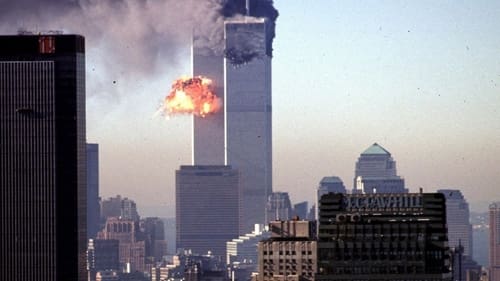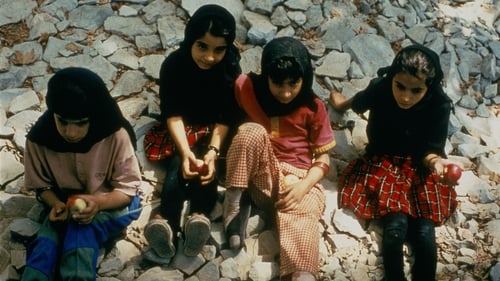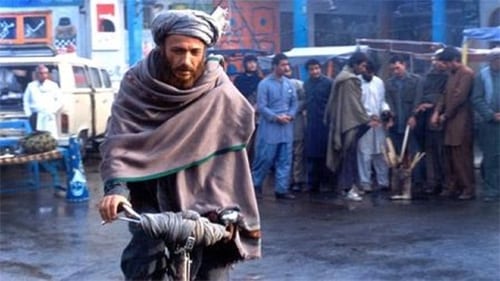Samira Makhmalbaf
出生 : 1980-02-15, Tehran, Iran
略歴
Samira Makhmalbaf (born February 15, 1980) is an internationally acclaimed Iranian filmmaker and script writer. She is the daughter of Mohsen Makhmalbaf, the film director and writer. She is considered to be one of the most influential directors as part of the Iranian New Wave.

Samira Makhmalbaf
It is a story of a unique family in the world; A documentary on how a former political imprisoned revolutionary in a religious closed society like Iran, turned his house in to an open Film School and pave to way for his family to became world class film maker and top International award winners , including Cannes Venice , Berlin, San Sebastian , Locarno and many.

Producer
A wealthy boy hires a poor child to carry him around like a horse.

Director
A wealthy boy hires a poor child to carry him around like a horse.

Self
Tracing the history and influence of Iranian cinema and its filmmakers.

Herself
Documentary showing the backstage of production of Samira Makhmalbaf's film Panj É Asr(At Five in the Afternoon), in Kabul, after the fall of the Taliban regime. Everything was recorded with a small digital camera by Samira's 14-year-old sister Hana.

Cinematography
Nogreh is a young Afghani woman living with her father and her sister-in-law, Leylomah, whose husband, Akhtar, is missing. Beyond the issue of Akhtar, Leylomah is most concerned with how to feed her baby. She cannot provide milk for her baby as her own hunger is preventing her from lactating. Nogreh, however, aspires toward a life in a western styled democracy. Although the Taliban are no longer in power in Afghanistan, traditional forces are still active in the country. Nogreh often displays signs of rebellion, such as wearing a pair of white pumps instead of the traditional slipper beneath her burqa. But mostly, Nogreh wants to be educated. Without her father's knowledge, Nogreh is attending a secular girls school. Ultimately, she wants to become President of Afghanistan. With the help of a Pakistani refugee who likes her as a woman, Nogreh tries to understand exactly what forces led to current world leaders being elected, those forces which she wants to emulate.

Screenplay
Nogreh is a young Afghani woman living with her father and her sister-in-law, Leylomah, whose husband, Akhtar, is missing. Beyond the issue of Akhtar, Leylomah is most concerned with how to feed her baby. She cannot provide milk for her baby as her own hunger is preventing her from lactating. Nogreh, however, aspires toward a life in a western styled democracy. Although the Taliban are no longer in power in Afghanistan, traditional forces are still active in the country. Nogreh often displays signs of rebellion, such as wearing a pair of white pumps instead of the traditional slipper beneath her burqa. But mostly, Nogreh wants to be educated. Without her father's knowledge, Nogreh is attending a secular girls school. Ultimately, she wants to become President of Afghanistan. With the help of a Pakistani refugee who likes her as a woman, Nogreh tries to understand exactly what forces led to current world leaders being elected, those forces which she wants to emulate.

Scenario Writer
Nogreh is a young Afghani woman living with her father and her sister-in-law, Leylomah, whose husband, Akhtar, is missing. Beyond the issue of Akhtar, Leylomah is most concerned with how to feed her baby. She cannot provide milk for her baby as her own hunger is preventing her from lactating. Nogreh, however, aspires toward a life in a western styled democracy. Although the Taliban are no longer in power in Afghanistan, traditional forces are still active in the country. Nogreh often displays signs of rebellion, such as wearing a pair of white pumps instead of the traditional slipper beneath her burqa. But mostly, Nogreh wants to be educated. Without her father's knowledge, Nogreh is attending a secular girls school. Ultimately, she wants to become President of Afghanistan. With the help of a Pakistani refugee who likes her as a woman, Nogreh tries to understand exactly what forces led to current world leaders being elected, those forces which she wants to emulate.

Director
Nogreh is a young Afghani woman living with her father and her sister-in-law, Leylomah, whose husband, Akhtar, is missing. Beyond the issue of Akhtar, Leylomah is most concerned with how to feed her baby. She cannot provide milk for her baby as her own hunger is preventing her from lactating. Nogreh, however, aspires toward a life in a western styled democracy. Although the Taliban are no longer in power in Afghanistan, traditional forces are still active in the country. Nogreh often displays signs of rebellion, such as wearing a pair of white pumps instead of the traditional slipper beneath her burqa. But mostly, Nogreh wants to be educated. Without her father's knowledge, Nogreh is attending a secular girls school. Ultimately, she wants to become President of Afghanistan. With the help of a Pakistani refugee who likes her as a woman, Nogreh tries to understand exactly what forces led to current world leaders being elected, those forces which she wants to emulate.

Writer
Filmmakers from all over the world provide short films – each of which is eleven minutes, nine seconds, and one frame of film in length – that offer differing perspectives on the 9/11 terrorist attacks.

Director
Filmmakers from all over the world provide short films – each of which is eleven minutes, nine seconds, and one frame of film in length – that offer differing perspectives on the 9/11 terrorist attacks.

The film and camera of Maysam Mkhamlbaf, Samira's brother follows her like an invisible eye. From her first subconscious presence as an actor, when she was one months old and crying in her mothers arms, while acting in a feature movie made by his father up to her first conscious appearance as an 8 year old child actor in the movie Cyclist made by his father in Pakistan. From when Samira made her first movie Apple at 17 or when she goes to visit the two imprisoned girls in the movie "Apple" and when she is occupied with changing the professional actor of the movie "Blackboard" with a non-professional actor (ordinary people) and even when she was attending the Cannes Film Festival in the years 1998 and 2000.

Writer
Itinerant Kurdish teachers, carrying blackboards on their backs, look for students in the hills and villages of Iran, near the Iraqi border during the Iran-Iraq war. Said falls in with a group of old men looking for their bombed-out village; he offers to guide them, and takes as his wife Halaleh, the clan's lone woman, a widow with a young son. Reeboir attaches himself to a dozen pre-teen boys weighed down by contraband they carry across the border; they're mules, always on the move. Said and Reeboir try to teach as their potential students keep walking. Danger is close; armed soldiers patrol the skies, the roads, and the border. Is there a role for a teacher? Is there hope?

Director
Itinerant Kurdish teachers, carrying blackboards on their backs, look for students in the hills and villages of Iran, near the Iraqi border during the Iran-Iraq war. Said falls in with a group of old men looking for their bombed-out village; he offers to guide them, and takes as his wife Halaleh, the clan's lone woman, a widow with a young son. Reeboir attaches himself to a dozen pre-teen boys weighed down by contraband they carry across the border; they're mules, always on the move. Said and Reeboir try to teach as their potential students keep walking. Danger is close; armed soldiers patrol the skies, the roads, and the border. Is there a role for a teacher? Is there hope?

Assistant Director
Khorshid, a blind child growing up in Tajikistan, is constantly distracted by music and sounds. This frequently causes him to be late to his job as an instrument tuner even though he runs the risk of being fired at a time when his family is in danger of being evicted from their house.

Writer
After twelve years of imprisonment by their own parents, two sisters are finally released by social workers to face the outside world for the first time.

Director
After twelve years of imprisonment by their own parents, two sisters are finally released by social workers to face the outside world for the first time.

Herself
Director Mohsen Makhmalbaf claims to have never seen a movie before making his first film. Doubtful as it sounds, this boast matches perfectly with the controversial artist's personae. Stardust Stricken -- Mohsen Makhmalbaf: A Portrait documents the work of this Iranian filmmaker. After spending time in prison for political dissidence, Makhmalbaf discovered the social potential of the cinema. Some of his projects include Marriage of the Blessed and The Actor. While creating around 20 films, the outspoken director established new ideas about the nature of his work. In this release, Makhmalbaf speaks about art, human behavior, and his evolving fundamentalist beliefs.

An Iranian actor named Akbar is trying to become a serious actor instead of the clown everyone considers him to be. However financial problems force him to abandon his dream of being an artistic actor. He also has to deal with his family problems and his wife's inability to become pregnant.

The wife of Nasim, an Afghan immigrant in Iran, is gravely ill. He needs money to pay for her care, but his day labor digging wells does not pay enough. A friend connects Nasim to a two-bit promoter who sells tickets to watch Nasim ride a bicycle continuously for a week. The promoter brings in sick and aged spectators, haranguing them to find hope in Nasim's strength. Aided by his son, who feeds him as he rides, Nasim grinds out the days and shivering nights. Local officials believe this may be a plot and Nasim may be a spy; they try to sabotage him as do those who bet he won't finish the week. Will desperation alone get Nasim the money? Is any triumph an illusion?








